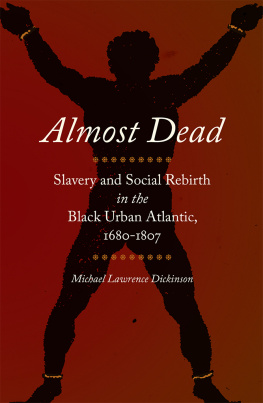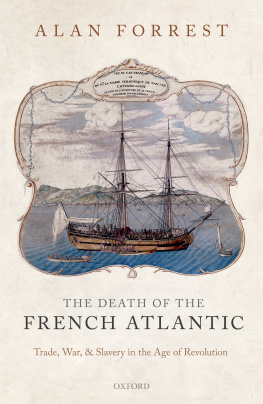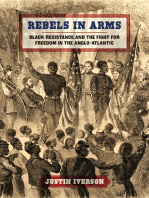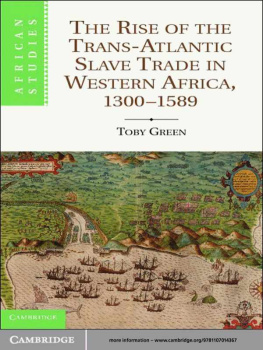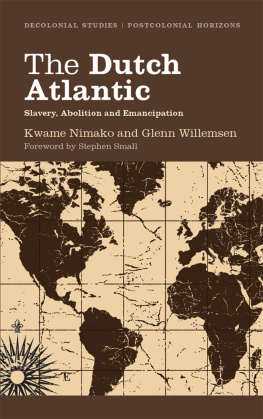Almost Dead
RACE IN THE ATLANTIC WORLD, 17001900
SERIES EDITORS
Richard S. Newman, Rochester Institute of Technology
Patrick Rael, Bowdoin College
Manisha Sinha, University of Connecticut
ADVISORY BOARD
Edward Baptist, Cornell University
Christopher Brown, Columbia University
Vincent Carretta, University of Maryland
Laurent Dubois, University of Virginia
Erica Armstrong Dunbar, Rutgers University
Douglas Egerton, LeMoyne College
Leslie Harris, Northwestern University
Joanne Pope Melish, University of Kentucky
Sue Peabody, Washington State University, Vancouver
Erik Seeman, State University of New York, Buffalo
John Stauffer, Harvard University
Almost Dead
SLAVERY AND SOCIAL REBIRTH IN THE BLACK URBAN ATLANTIC, 16801807
Michael Lawrence Dickinson
The University of Georgia Press
ATHENS
Published by the University of Georgia Press
Athens, Georgia 30602
www.ugapress.org
2022 by Michael Lawrence Dickinson
All rights reserved
Set in 10.5/13.5 Adobe Caslon Pro Regular
by Longleaf Publishing Services
Most University of Georgia Press titles are available from popular e-book vendors.
Printed digitally
Library of Congress Control Number: 2021943876
ISBN: 9780820362250 (hardback)
ISBN: 9780820362267 (paperback)
ISBN: 9780820362243 (ebook)
Dedicated to my mother,
Alice Dickinson,
continually missed, perpetually loved,
and never forgotten
CONTENTS
There is a lengthy list of people I must thank for their assistance and support in completing this book. Unfortunately, two of the most influential people in my life passed away as I worked on this project: my mother, Alice Dickinson, and my aunt (and self-proclaimed second mother) Minnie Wilson. They were two immensely strong black women who had no shortage of love for those around them. I am especially indebted to my mother for her constant care, devotion, and faith in me. Both women were historians in their own right, always willing to share tales of the past along with warmth and laughter. As I completed this project, I was surrounded by these lovely women regaling me about how my grandfather, a World War II veteran I never had the pleasure of meeting, wrote a book which was unfortunately destroyed in a fire before being published. My hope, then, is to fulfill their hopes along with those of Orville Baynard and the rest of my forebears whose stories deserve recognition.
On a professional note, this project is the result of constant feedback and support from an array of colleagues and institutions. I would first like to thank my academic parents, Erica Armstrong Dunbar and W. O. Maloba. It was Erica who first took an interest in me and persuaded me to abandon my medical school plans to pursue a career in history, easily one of the most significant decisions of my life. Erica, your passion for historical scholarship and selfless support over the years have meant more than words can convey. Maloba, your intellectual vision and endless guidance have made all the difference in completing this journey. Thank you both for your continued encouragement and limitless sacrifice.
It is important to also thank all the educators throughout my life who fanned the flames of my love for history. Further, I must attribute much of my academic accomplishments to the many programs that fostered my interests and talents. I am grateful to the Delaware Trio Programs, which encouraged me to pursue academic excellence prior to graduate study; in particular, I am grateful to Lin Gordon and Lysbet Murray in this regard. Most significantly of all, I owe a grave debt to the McNair Scholars Program for instructing me in the art of research and empowering me with the means to realize my professional goals. Many years ago, I was a young undergraduate in need of direction and patience, and the McNair Scholars Program provided me with just that. Specifically, I thank Maria Palacas and Heyward Brock for their patience, time, and careingredients that helped me to reach my potential. Maria, thank you for always believing in me and always placing the needs of others before your own. I could not have reached these heights without your mentorship. Heyward, I remain greatful for your time, patience, and care in teaching me how to conduct research. Much McNair Love to Vanessa Banegas, Adrian McCleary, Melissa Skolnick-Noguera, Kris Dewberry, Tanya Mejia, Obi Mmagu, and Joseph Stanley for their companionship and laughter over the years. During my time in this research program, I also had the pleasure of consulting with historian Rhys Isaac while in Australia. He passed away shortly after, but his intellectual generosity and willingness to share his time while ill were inspiring. I am considerably grateful as well to Peter Kolchin, who directed my senior thesis so many years ago and taught me the joys of comparative history.
I still reflect on the advice provided by my dissertation committee members, Cathy Matson and Marisa Fuentes, for which I remain deeply grateful. A special thanks to Cathy for expanding my understanding of the Atlantic and for her willingness to always challenge me. The Africana Studies and History Departments at the University of Delaware (UD), where I attended undergraduate and graduate school, deeply shaped my intellectual development. Therefore, I am indebted to faculty and staff in both departments. The list of instructors and advisors who invested in my intellectual and academic development is quite extensive. A special note of gratitude to Gabrielle Foreman, Tiffany Gill, Tammy Poole, Yasser Payne, and Carol Rudisell for their incredible support and for deeply shaping my vision of African American history. Anne Boylan, Eve Buckley, Daniel Callahan, John Davies, Rebecca Davis, Howard Johnson, James Jones, Arwen Mohun, David Suisman, Jorge Serrano, Doug Tobias, Patricia Sloane-White, and Owen Whitethank you for your encouragement and kindness. Many thanks to my fellow graduate students at UD for running the tireless race of graduate school with me, in particular Clayton Colmon, Harrison Graves, Alexandra Mairs-Kessler, Nalleli Guillen, Kelsey Ransick, Sarah Patterson, Jessica Conrad, OBrian Holden, and John Vanek.
Many colleagues and friends were generous enough to provide me with feedback on various parts of the manuscript. At Virginia Commonwealth University (VCU), my home institution, I had the privilege of workshopping multiple chapters within an intellectually robust early America reading group. In particular, Richard Godbeer, Sarah Meacham, and Gregory Smithers were among the group members who provided thoughtful feedback. I would like to extend a special thanks to my colleagues Carolyn Eastman, Brooke Newman, and Ryan Smith at VCU, along with Dexter Gabriel at the University of Connecticut and Alexander Byrd at Rice University for providing in-depth commentary on specific chapters along with their friendship. Dexter, my intellectual brother in many ways, has been a friend since graduate school, and I can always turn to him for feedback, laughter, and collaboration. Both Alex and Carolyn have both been incredible mentors going far above and beyond their assigned, official mentorship roles. I am also exceptionally grateful to Richard Newman for his tremendous support, mentorship, and genuine thoughtfulness over the years.
Several institutions were generous enough to support this project. The book incorporates some material from my graduate dissertation, so I remain indebted to the University of Delaware for funding my early research trips all those years ago while I completed my doctorate. In addition, Virginia Commonwealth University has provided funding for research trips, and the VCU Humanities Research Center also funded my efforts to present various parts of the book at conferences. Duke University generously encouraged my efforts to produce the manuscript through its Center for the Study of Race, Ethnicity, and Gender in the Social Sciences. Likewise, the University of Pennsylvanias McNeil Center for Early American Studies awarded me a sabbatical fellowship to complete the book project along with research funds. I am greatly indebted to these programs for their scholarly connections and intellectual engagement. At McNeil in particular, I had the pleasure of briefly mentoring a number of graduate fellows, all of whom are brilliant and have bright futures. I also had the pleasure of receiving feedback on a chapter from the collective McNeil community. The experience was invaluable to the project, and I remain extraordinarily indebted. I would especially like to thank Dan Richter, Laura Spero, the McNeil staff, and my fellowship counterpart Zara Anishanslin for their hospitality and support.

